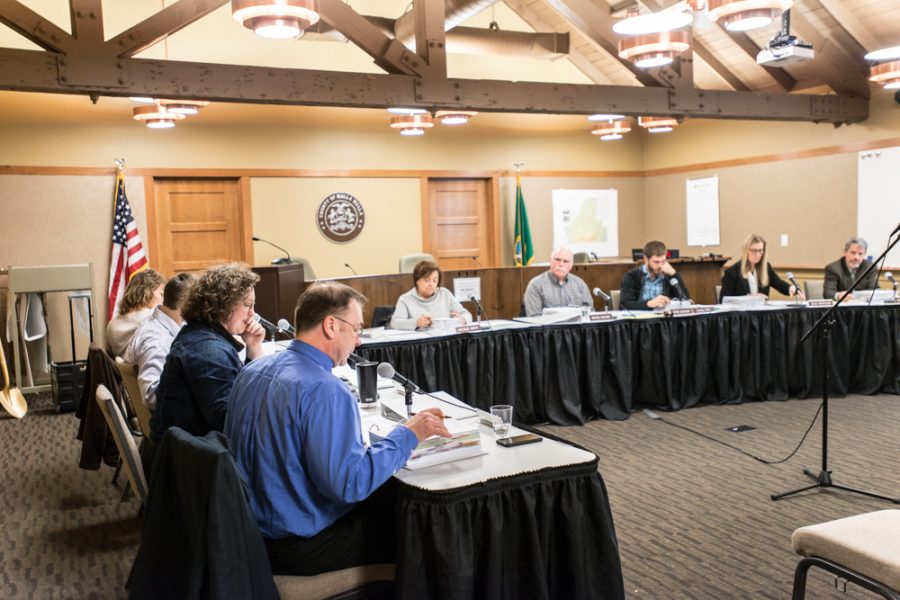This article was produced in collaboration with Anna Middleton and Andrew Schwartz of The Pio Radio Hour. The interviews with Scott Andrews and Glenna Awbrey were conducted by Middleton and Schwartz as part of a larger series on homelessness in Walla Walla. Tune to KWCW 90.5 FM at 10 a.m. on Sundays to hear more. The show is also available for online streaming at www.mixcloud.com/WhitmanPioneer/.
On Valentine’s Day of 2011, Scott Andrews was released from the Washington State Penitentiary. After 18 years and seven months, Andrews said goodbye to his structured prison life and stepped foot on a bus to Pasco, Wash. and into the fast-paced 21st Century.
Transitioning to a life out of prison can be difficult for many former inmates. A report from the Washington State Department of Corrections states that 31.2 percent of those released from prison will re-offend within three years of their release.
The Walla Walla Successful Training and Re-entry (STAR) Project provides support for former inmates released into the Walla Walla and Columbia counties. Founded in 2004, the project aims to aid transitioning offenders in finding housing, employment, education and food benefits, as well as helping with the general transition back into society.
While still in prison, Andrews sent a letter to the STAR project, but the reply he got was dismaying; due to funding, they said, they would have to close their doors. However, after being released he heard through word of mouth that the project was still up and running.
After being released, prisoners are often required to be on parole in the county where they committed their crime. Andrews was required to stay in Walla Walla County for three years. Originally from Florida, he was not personally connected to the county, thus lacking a strong support network.
“I was scared,” said Andrews of the day he was released. “They give you 40 dollars in cash and a check for anything that was in your inmate account, a pat on the back and pretty much tell you ‘we’ll leave the light on for you.'”
After arriving in Pasco, Andrews spent three months living in a motel managed by the mother of one of his cellmates. For two or three weeks after his release, Andrews didn’t journey further than 100 yards from the motel.
“You can’t come out of a structure like prison and think that you’re just going to step into the mainstream and run with everybody else,” said Andrews. “It’s not going to happen.”
After his three months at the motel, Andrews moved to Walla Walla and got in touch with STAR. Since then four years have passed; Andrews is still a client of STAR but is currently self-sufficient. He graduated from Walla Walla Community College in 2013 and is now employed full time.
Like most former inmates, however, Andrew’s path to employment wasn’t easy.
Many job applications include a box which applicants must check if they have been convicted of a felony. This can lead employers to dismiss their applications without reading the full application. Opposition to such a requirement on job applications has grown since the “Ban the Box” movement was founded in 2004. While some employers maintain that they have the right to include such a question, those in support of the movement argue that applicants should have the opportunity to make a first impression before they are ruled out.
Because more than seven years had passed since his conviction, Andrews wasn’t required to check the box on his job applications disclosing that he had been convicted of a felony. But this didn’t prevent him from being asked if he had ever committed a felony at job interviews, to which he always answered truthfully. Sometimes he got turned away.
The prospect of finding employment for felons who do still have to check the box is even more daunting. When they can’t find employment, convicted felons often turn to crime, reverting back to the lifestyles they had before prison. One of the things STAR is doing is supporting “Ban the Box” legislation through Washington Fair Chance Coalition, which, if passed, would make it illegal for employers to ask about a felony on their applications.
“We’re pretty proactive in getting the Ban the Box legislation passed,” said Executive Director of the STAR project Glenna Awbrey. “That doesn’t mean that once the person is called in for an interview that [the question of whether or not they have a felony conviction] wouldn’t be asked, and it should be asked. It’s just at least to give people the opportunity to get in.”
Awbrey stated that since being involved with the STAR project, her views on people with felony convictions have changed.
“If people can get into a job and start working, most of them are really really good employees. And I’ve had employers tell me that all the time,” said Awbrey. “It’s getting past that initial fear or ignorance, or whatever it is, to actually interacting with people one on one … I think [there are] going to have to be law changes so that it forces people to look at things differently.”
Hearings for the Ban the Box legislation, formally titled the Fair Chance Act, are taking place in both the Washington State House and Senate this week.
Mitch Clearfield, a senior lecturer of philosophy at Whitman, teaches a course on punishment and responsibility. Clearfield became interested in issues of incarceration when he moved to Walla Walla in 2001. He later spent two years on the board of the STAR project.
Clearfield believes a big obstacle for people who hold a felony conviction is a contradiction in the way society views punishment.
“I think our society has this kind of conflicted mindset where we hope people do better, and we want people to do better, but we also don’t want to do anything that’s going to lead them to doing better. Because they did wrong, and they don’t deserve that,” said Clearfield. “Why are we letting people out if we don’t think they’re ready to succeed? And if we think they’re ready to succeed, let’s let them succeed.”
Andrews doesn’t want to be judged by his past. He said he deserved to go to prison and that his time served made him who he is today, but that doesn’t mean he shouldn’t get a second chance.
“How would you feel if it was your kid? Your kid’s the one that’s getting looked at like that, getting talked down to. Almost every avenue that they try to go down, coming to a roadblock, getting doors slammed into their face,” said Andrews. “Correction officers telling you, ‘Yeah, we’ll keep the light on’ … People need to realize that people make mistakes. We’re all human.”

















